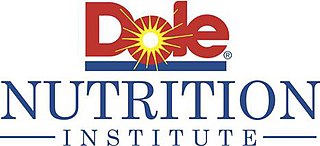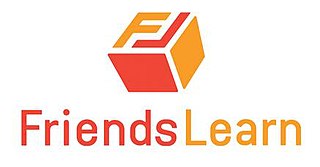
A healthy diet is a diet that maintains or improves overall health. A healthy diet provides the body with essential nutrition: fluid, macronutrients such as protein, micronutrients such as vitamins, and adequate fibre and food energy.

The Center for Science in the Public Interest (CSPI) is a Washington, D.C.-based non-profit watchdog and consumer advocacy group that advocates for safer and healthier foods.
A fat tax is a tax or surcharge that is placed upon fattening food, beverages or on overweight individuals. It is considered an example of Pigovian taxation. A fat tax aims to discourage unhealthy diets and offset the economic costs of obesity.
Farm to School is a program in the United States through which schools buy and feature locally produced, farm-fresh foods such as dairy, fruits and vegetables, eggs, honey, meat, and beans on their menus. Schools also incorporate nutrition-based curriculum and provide students with experiential learning opportunities such as farm visits, garden-based learning, and recycling programs. As a result of Farm to School, students have access to fresh, local foods, and farmers have access to new markets through school sales. Farmers are also able to participate in programs designed to educate kids about local food and agriculture.

Gary Taubes is an American journalist, writer, and low-carbohydrate / high-fat (LCHF) diet advocate. His central claim is that carbohydrates, especially sugar and high-fructose corn syrup, overstimulate the secretion of insulin, causing the body to store fat in fat cells and the liver, and that it is primarily a high level of dietary carbohydrate consumption that accounts for obesity and other metabolic syndrome conditions. He is the author of Nobel Dreams (1987); Bad Science: The Short Life and Weird Times of Cold Fusion (1993); Good Calories, Bad Calories (2007), titled The Diet Delusion (2008) in the UK and Australia; Why We Get Fat: And What to Do About It (2010); The Case Against Sugar (2016); and The Case for Keto: Rethinking Weight Control and the Science and Practice of Low-Carb/High-Fat Eating (2020). Taubes's work often goes against accepted scientific, governmental, and popular tenets such as that obesity is caused by eating too much and exercising too little and that excessive consumption of fat, especially saturated fat in animal products, leads to cardiovascular disease.
The British Nutrition Foundation is a British registered charity and company limited by guarantee that works to share scientific knowledge and advice on diet, physical activity and health.
Obesity in Mexico is a relatively recent phenomenon, having been widespread since the 1980s with the introduction of ultra-processed food into much of the Mexican food market. Prior to that, dietary issues were limited to under and malnutrition, which is still a problem in various parts of the country. Following trends already ongoing in other parts of the world, Mexicans have been foregoing the traditional Mexican diet high in whole grains, fruits, legumes and vegetables in favor of a diet with more animal products and ultra-processed foods. It has seen dietary energy intake and rates of overweight and obese people rise with seven out of ten at least overweight and a third clinically obese.
Fruits & Veggies – More Matters is a national public health initiative from Produce for Better Health Foundation and Centers for Disease Control and Prevention (CDC) to increase the consumption of fruits and vegetables. This campaign, begun in 2007, took the place of the 5 A Day program. The shift was implemented in order to better communicate updated dietary guidelines, which recommended more than five servings of fruits and vegetables for some Americans.

The Dole Nutrition Institute (DNI) is a research and education foundation within the Dole Food Company and is based in Kannapolis, North Carolina, at the North Carolina Research Campus. The DNI was founded by David H. Murdock in 2003. The institute exists as a resource offering educational publications on a plant-based diet.
Food studies is the critical examination of food and its contexts within science, art, history, society, and other fields. It is distinctive from other food-related areas of study such as nutrition, agriculture, gastronomy, and culinary arts in that it tends to look beyond the consumption, production, and aesthetic appreciation of food and tries to illuminate food as it relates to a vast number of academic fields. It is thus a field that involves and attracts philosophers, historians, scientists, literary scholars, sociologists, art historians, anthropologists, and others.

Let's Move! was a public health campaign in the United States led by former First Lady Michelle Obama. The campaign aimed to reduce childhood obesity and encourage a healthy lifestyle in children.
Nutrition education is a set of learning experiences designed to assist in healthy eating choices and other nutrition-related behavior. It includes any combination of educational strategies, accompanied by environmental supports, designed to facilitate voluntary adoption of food choices and other food and nutrition-related behaviors conducive to health and well-being. Nutrition education is delivered through multiple venues and involves activities at the individual, community, and policy levels. Nutrition Education also critically looks at issues such as food security, food literacy, and food sustainability.
The Childhood Obesity Task Force is a United States Government task force charged with reducing childhood obesity in the United States. It was founded on February 9, 2010, by the Obama Administration through a Presidential Memorandum, announcing the establishment of a Task Force on Childhood Obesity. The Task Force aims to develop a plan to reduce childhood obesity. In the announcement, President Barack Obama highlighted the statistics on childhood obesity in the United States and outlined the steps that this new task force would be taking to end childhood obesity. Section 1 of the Memorandum states:
There is established a Task Force on Childhood Obesity to develop an interagency action plan to solve the problem of obesity among our Nation's children within a generation. The Assistant to the President for Domestic Policy shall serve as Chair of the Task Force.
Wholesome Wave is an American nonprofit organization focused on nutrition and access to fresh food. Wholesome Wave operates two nutrition incentive programs, the Double Value Coupon Program and the Fruit & Vegetable Prescription Program, which tackle the issue of affordability for underserved consumers. The organization works with food hubs, retail outlets and convenience stores. Wholesome Wave's programs address the complex issues of food insecurity, farm viability, economic vitality of local communities, and diet-related diseases. Wholesome Wave was founded in 2007 by Michael Batterberry, Gus Schumacher and Michel Nischan.

MyPlate is the current nutrition guide published by the United States Department of Agriculture's Center for Nutrition Policy and Promotion, and serves as a recommendation based on the Dietary Guidelines for Americans. It replaced the USDA's MyPyramid guide on June 2, 2011, ending 19 years of USDA food pyramid diagrams. MyPlate is displayed on food packaging and used in nutrition education in the United States. The graphic depicts a place setting with a plate and glass divided into five food groups that are recommended parts of a healthy diet. This dietary recommendation combines an organized amount of fruits, vegetables, grains, protein, and dairy. It is designed as a guideline for Americans to base their plate around in order to make educated food choices. ChooseMyPlate.gov shows individuals the variety of these 5 subgroups based on their activity levels and personal characteristics.

The Partnership for a Healthier America (PHA) is a nonprofit organization created in conjunction with - but separate from - former First Lady Michelle Obama's Let's Move! effort in 2010. PHA works with the private sector to transform the food landscape in pursuit of health equity. Mrs. Obama currently serves as PHA's honorary chair, and alongside Higher Ground Productions, launched the Pass the Love w/ Waffles + Mochi campaign on March 10, 2021, with PHA to raise funds to aid in the distribution of 1 million meals to families in need around the country. Inspired by the Netflix series Waffles + Mochi, the campaign also raises awareness about food equity.
School meals are provided free of charge, or at a government-subsidized price, to United States students from low-income families. These free or subsidized meals have the potential to increase household food security, which can improve children's health and expand their educational opportunities. A study of a free school meal program in the United States found that providing free meals to elementary and middle school children in areas characterized by high food insecurity led to increased school discipline among the students.

FOOD started in 2009 in six countries as a European project co-funded by the European Commission and gathering public and private partners to promote balanced nutrition. Since 2012, it has become an independent programme existing in 10 countries: Austria, Belgium, Czech Republic, France, Spain, Italy, Portugal, Romania, Slovakia and Sweden.

FriendsLearn is a privately held life science research and biotechnology mHealth company, with offices in San Francisco California and Chennai. The company was founded in 2011 and develops mobile health technologies, best known as the producer and developer of fooya!. FriendsLearn is a pioneer of Digital Vaccines, which Carnegie Mellon University featured as one of the top breakthroughs in technology as part of the annual "Year in Review" publication. The company is known for first in class therapeutic candidates in the field of neuromodulation and neurocognitive training through the use of artificial intelligence, virtual reality technology, neuropsychology based behavior design, gamification and learnified entertainment.
EChO - Eradicate Childhood Obesity Foundation, Inc. is a 501(c)(3) public charity based in Cambridge, MA dedicated to ending childhood obesity. Established in 2015, the foundation aims to promote healthier lifestyles through the use of nutrition education, technology, and novel, easy-to-understand food labels.








